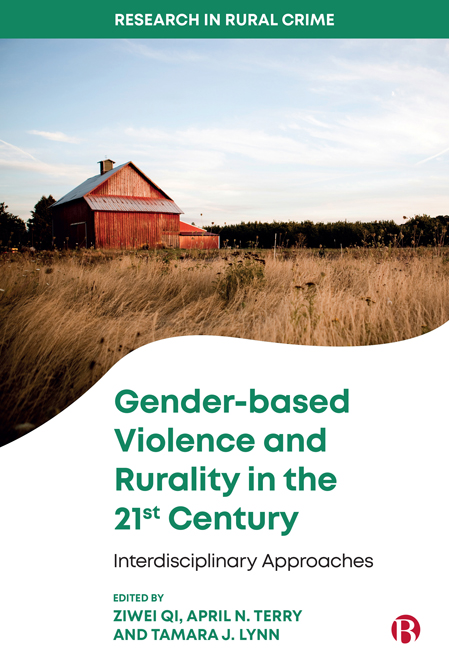Book contents
- Frontmatter
- Contents
- Series Preface
- List of Figures and Table
- List of Abbreviations
- Glossary
- Notes on Contributors
- Foreword
- 1 Understanding Rurality and Gender-based Violence
- PART I Rurality and Gender-based Violence
- PART II Beyond the Rural/Urban Divide: Critical Issues in Gender-based Violence
- PART III Access to Rural Justice: Economic Consequences and Policy Implications
- Index
3 - Gender Blindness for At-risk Girls in Rural Communities
Published online by Cambridge University Press: 20 January 2024
- Frontmatter
- Contents
- Series Preface
- List of Figures and Table
- List of Abbreviations
- Glossary
- Notes on Contributors
- Foreword
- 1 Understanding Rurality and Gender-based Violence
- PART I Rurality and Gender-based Violence
- PART II Beyond the Rural/Urban Divide: Critical Issues in Gender-based Violence
- PART III Access to Rural Justice: Economic Consequences and Policy Implications
- Index
Summary
Introduction
As a research team tasked with developing local initiatives for juvenile justice practices, our entry into rural research sites was built on listening tours and semi-structured gatherings involving more than 100 community stakeholders. At every point, we were surprised to see almost no reference to gender or the unique experiences of systeminvolved girls. (Sue, personal narrative, 15 March 2020)
The noteworthy long silences about gender encountered during fieldwork in rural communities stand in sharp contrast to the ubiquity of genderbased inequities around the globe. Gender-based violence (GBV) is a deeply entrenched issue of gender inequality and discrimination (Council of Europe, 2011), including emotional and psychological harm (Ott, 2017), deprivation of liberty (United Nations General Assembly, 1993) and human rights violations (European Institute for Gender Equality, 2020). According to a study conducted by the World Health Organization (WHO), one in three women who have been in a relationship have experienced physical and/or sexual violence by an intimate partner or sexual violence from a non-partner at some point in their lives (WHO, 2021).
The paucity of attention to GBV for at-risk girls and subsequent involvement within the juvenile justice system is even more stark. First, age matters. While intimate partner violence is the most prevalent form of violence against women, younger women remain at highest risk (WHO, 2021). Leading studies (such as WHO, 2021) document the damaging consequences of violence on women's health, including risks for injuries, depression, anxiety disorders, sexually transmitted infections and other health problems. Little attention is directed towards ‘hidden harms’ for at-risk girls, and especially those in rural areas, and the existing few have focused exclusively on urban locations, ignoring the unique sociopolitical differences of rural communities. The current study directs attention towards this continued oversight, demanding intentional efforts towards gender-responsive needs, including indirect forms of GBV, for at-risk girls everywhere, including rural areas.
These authors conducted a two-year research project on juvenile justice issues in isolated areas of western Kansas within the United States. As background, in 2016, the state of Kansas passed a comprehensive juvenile justice reform bill, Senate Bill 367 (SB 367) (Kansas Legislative Session, 2017).
- Type
- Chapter
- Information
- Gender-based Violence and Rurality in the Twenty-first CenturyInterdisciplinary Approaches, pp. 30 - 44Publisher: Bristol University PressPrint publication year: 2023



